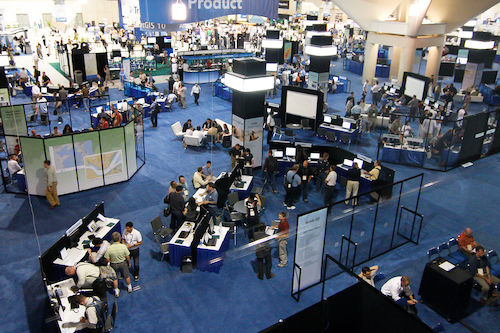The United States Exhibitions Market is home to a diverse variety of industries, locations and cultures. Each of the 50 states offers various convention platforms and exhibition venues that fit the needs of every industry. The busiest and largest convention centers are located in Las Vegas, NV; Orlando, FL and Chicago, IL, with Chicago’s McCormick Place being the largest at 2.6 million square feet.
Culturally, the venues span from fast-paced, big cities, like New York, to rural settings at country fairgrounds. Venues for exhibitions and trade fairs are strategically located in places where many international influences in language, entertainment and food can be found. Below is a brief look into the U.S. exhibition market.

Lots of Ports of Entry
There are many ports of entry in the U.S. where freight can be shipped; the challenge is knowing which airport or seaport to ship to for the intended destination. The destination climate can also affect the success of the event, with conditions like heavy rain, blizzards and hurricanes causing delays and even cancellations in the past.
Ocean Shipping
If you are planning to bring in a full container via ocean freight, you need to plan early to avoid delays from bad weather or missed schedules by the vessels. However, you can still experience delays due to customs inspections, which may require your merchandise to be stored at the port for extra days.
Balancing between the arrival of the container and date of delivery without having to incur extra charges can be a daunting task. This is because the seaport only allows for 5 free days of storage before you have to move it. If the show provides an advance warehouse, it would be better to move the freight there, although you will incur additional handling costs from the general contractor.
General Contractors
Most shows in the U.S. are handled by a general contractor, such as GES or Freeman. The contractors handle your shipment upon arrival at the exhibition venue whether you are taking it directly to the stand or to the advance warehouse. Normally, they have set tariffs they directly bill to you for the services they provide.
When delivering directly to a venue, the contractors usually provide a marshalling yard where the truckers check in and receive a number and wait to be called to the venue to offload. This helps in relieving congestion that would otherwise occur in convention centers with limited space for the trucks. You should, however, be ready for long waits that last anywhere from a few hours to a whole day.
Targeted Move-In
Targeted move-in refers to a schedule some contractors provide of how goods should be delivered to the show, complete with specific dates and time. Delivering out of the stipulated time results in extra charges, which is why delivering to the advance warehouse is a better choice. If you are not comfortable with the delivery date, you can apply for it to be changed by the contractor.
Forced Freight
Forced freight occurs when a carrier delays collecting the goods from the event’s venue. When this happens, the contractor moves the freight to a designated storage location and then, charges you for the service.
Usually, forced freight happens due to the Bill of Lading for the trucker or Material Handling Agreement, being filled out incorrectly or not at all. To avoid this, you should make sure to submit the right carrier details and destination address the agent has matches the one listed by the exhibitor.
New Truck Regulations
The costs charged by carriers have increased due to fuel surcharges and a regulation that took effect in 2018 requiring drivers to digitally log their hours. This has limited their operating hours, forcing carriers to book team drivers to ensure goods arrive at the intended destination on time. The resulting driver shortages has led to increased costs of transportation.
Types of Entries
Different entries are filed at customs for different types of goods depending on the type of material and purpose. In the case of exhibition goods, you can opt for Consumption entries, TIB’s or ATA Carnets, which are the most used entries for commercial goods not for sale in the U.S. Although a TIB and an ATA Carnet are both valid for one year, you can extend the TIB for up to 3 years.
Early Planning and Communication Is Key
It is common to make last-minute requests or tender shipments late, which is why early preparations are important. You need to research extensively about the shows and venue to plan accordingly. You can find information about your shows here. The more information you have early, the more likely the success for you and your customer.
AMR Group is here to help ease the burden of exhibit transportation and event logistics. We’ll ensure your shipment arrives on time at the right location. Contact us today at 702-800-6385 for more information or to request a shipping rate.
